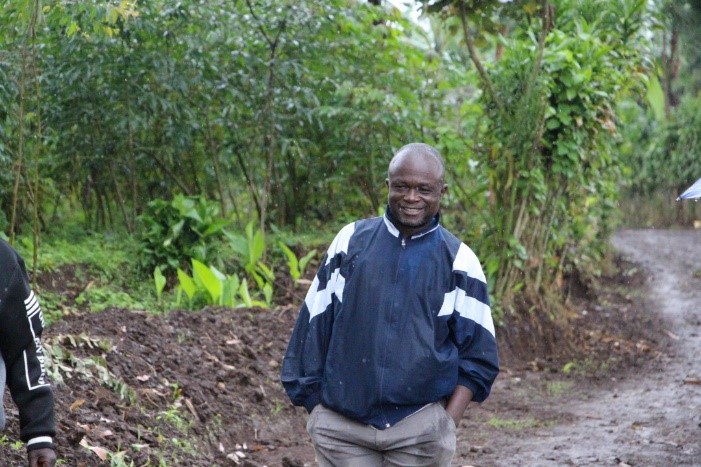Interview of Josué ARUNA, CBCS
Published on 24 June 2021
Hello Josué, you are the Executive Director of the Congolese CSO Congo Basin Conservation Society (CBCS). Can you tell us a few words about this organization and its objectives?
CBCS is a Congolese organization created in 2016 that supports the rational management of natural resources and biodiversity in the ecosystems of the Congo Basin while helping local communities and indigenous peoples to better benefit from ecosystem services.
CBCS seeks to provide appropriate responses to the problems of sustainable management of the natural resources of the Congo Basin and the negative socio-economic consequences that result from it. To achieve this, CBCS seeks to directly manage the causes of degradation of ecosystems and erosion of biodiversity through actions of restoration, advocacy and awareness of local communities. At the same time, we seek to combat wildlife crime and promote sustainable and climate-resilient agricultural entrepreneurship.
Your action is currently focused on two important sites in terms of conservation in South Kivu in the DRC, namely the Kahuzi Biega National Park (PNKB) and Lake Tanganyika, at the mouth of the Ruzizi river. The stakes are undoubtedly quite different, can you tell us a little about it?
Our interest is in fact directed towards these two sites because the two ecosystems located in the Albertine Rift are home to rare biodiversity as well as a wide variety of endemic and vulnerable species.
Note that at PNKB is one of the last refuges for Grauer’s gorillas, a species endemic to eastern DRC. The threats facing this park are linked in particular to the pressures caused by the neighboring communities, with the complicity of certain economic and political operators wanting to illegally exploit the natural resources inside it. This situation prompted us to position ourselves as Congolese citizens, in order to block the road to the destruction of gorilla habitat.
Our work mainly consists in carrying out advocacy actions with political decision-makers in order to ensure respect of the laws and international conventions on biodiversity conservation and to sensitize indigenous peoples and other communities in order to help them understand the benefits of conservation and peaceful cohabitation with the managers of the PNKB.
Regarding the Ruzizi river and its mouth to Lake Tanganyika, it is one of the privileged habitats, the last refuges for hippos in the province of South Kivu. This cross-border area with Burundi has known for more than a decade of significant wildlife crime situations leading to the poaching of hippos by the military and other individuals.
A vicious circle favorable to this phenomenon of poaching and trafficking has indeed started, because the local communities and indigenous peoples of the area seek revenge for the destruction of their fields, the phenomenon being amplified by a very strong anthropization of the environment. which causes significant and regular conflicts between humans and hippos.
In view of this, we seek to reduce wildlife crime while developing community strategies favorable to the participatory protection of hippos. This notably involves supporting the development of economic alternatives that make it possible to change the population’s perception of the presence of these species.
Where does your commitment to the issue of nature protection come from? What link do you make between this issue and the trajectory of a country like the DRC, particularly in terms of economic development and the well-being of its citizens?
Our commitment to the protection of nature was born out of a bitter observation observed for more than two decades after the so-called wars of liberation in the DRC and the massive arrival of refugees on Congolese soil.
This phenomenon is at the root of armed and community tensions and conflicts, which take the form of tensions over access to natural resources and land.
This situation has resulted in increased pressure on natural resources, biodiversity and degradation of ecosystems. In view of the incredible challenges in terms of biodiversity in this part of the Albertine Rift, we then decided to get involved, as Congolese citizens, to influence political decisions while bringing together other actors through a dynamic civil society network committed to the protection of nature.
Indeed, the cycle of conflict experienced in eastern DRC, and more particularly in Kivu, has reinforced poor governance and the plundering of natural resources. This situation does not allow the institutions in place and the population to lay the foundations for sustainable economic development for the well-being of Congolese citizens. This illegal exploitation of natural resources increases poverty and frustration among the population. It fuels armed and inter-community conflicts, insecurity, and leads to underdevelopment within decentralized territorial entities and disrespect for the rights of local communities and indigenous peoples.
The investment climate, which could allow the creation of jobs beneficial to young people, is slowing down due to this generalized insecurity caused by armed groups. Again, while often being observed in priority areas for biodiversity conservation, basic social infrastructure is non-existent (roads, hospitals, schools). Corruption, especially mining fraud and illegal and illicit trade in certain rare species, is also a real issue.
All these facts gave us a particular motivation, led to a collective awareness. Our engagement as citizens aims to show the potential benefits, especially in terms of development, of nature protection. Our slogan from the start has been “well-managed ecosystems = community development”.
What are the perspectives for CBCS for the coming year? What will be your priorities for action?
Our perspectives are to continue to sensitize and support local communities and indigenous peoples through economic alternatives around the PNKB and Lake Tanganyika, to further protect these key habitats and biodiversity.
We also wish to develop economic alternatives there, to support community tourism development initiatives, particularly around Lake Tanganyika and the Ruzizi river by setting up at least 3 hippopotamus observation points. Finally, we want to continue to organize campaigns against wildlife crime in different landscapes and support the strengthening of law enforcement.